History of the Institute for Medieval Studies
Overview
For 50 years, the University of Leeds has combined exceptional interdisciplinary teaching and research with a close-knit community interested in the Middle Ages. Our staff and students have access to some of the best resources for the study of the medieval period.
Internationally renowned for its specialism in Medieval Studies, Leeds is home to the Institute for Medieval Studies (IMS), the International Medieval Bibliography (IMB) and the International Medieval Congress (IMC). As a hub of outstanding research, we are committed to developing the next generation of medievalists and pushing the boundaries of academic knowledge and impact.
Believed to be the oldest interdisciplinary centre in the University, the Institute for Medieval Studies has been home to a large community of medievalists since 1967. Professor John Le Patourel, Professor of Medieval History, led a group of pioneers to form a centre of graduate studies; since then, the IMS has flourished, with over 70 staff, students and associates from around the world.
With resources such as the world-class Brotherton Library and the archives of the Yorkshire Archaeological and Historical Society based at the University, with the British Library’s Boston Spa Reading Room nearby, our students have access to some of the best medieval resources in the UK. Many of the medieval manuscripts of the Library can now be viewed online. The IMS has a long-standing cooperation with the Royal Armouries and Leeds City Museum and Galleries, as well as other regional heritage organisations. In addition, we have also a close association with the Centre d’études supérieures de civilisation médiévale at the University of Poitiers.
Graduate Centre for Medieval Studies: 1967-1978
We would like to explore the possibility of establishing an 'Institute for Medieval Studies' in this University
John Le Patourel and A. C. Cawley
12 November 1965
In 1967, a group of medievalists across the University of Leeds led by John Le Patourel (School of History) formed the Graduate Centre for Medieval Studies (GCMS).
The Centre was made up of a wide range of academics from many arts, humanities, and language disciplines with a shared love for teaching and studying the Middle Ages.
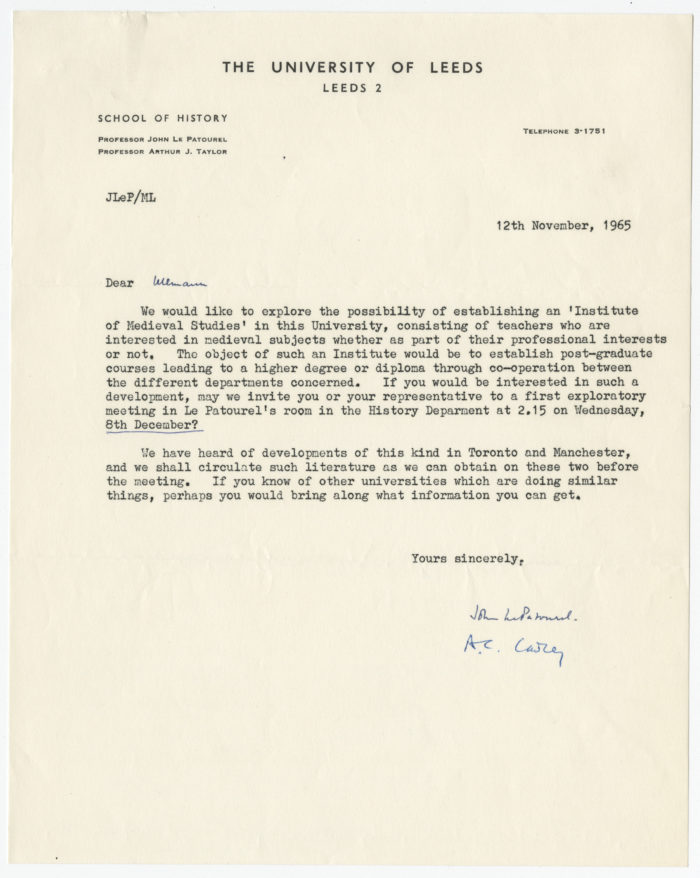
The letter written to propose the opening of the Graduate Centre.
The University of Leeds was a prominent location for the study of the Middle Ages long before the development of the GCMS. Alice Margaret Cooke was the second ever member
of staff in the School of History and the first appointed medievalist in 1907.
J.R.R. Tolkien was Reader in English Language from 1920-1925, during which time he produced a translations of Sir Gawain and the Green Knight, Sir Orfeo, and Pearl.
In the 1950s and 1960s W.A.G. Doyle Davidson, a founder member of the Medieval Group and the GCMS, taught adult education courses on medieval language and literature for the Leeds Workers Educational Association.
The GCMS’s core aims were to bring together medievalists from different departments and to develop an MA in Medieval Studies. The GCMS fostered strong links with other centres for Medieval Studies. John Smith Roskell, Professor of Medieval History at the University of Manchester, visited the nascent Centre at Leeds to offer advice in 1967, as Manchester had just developed a Medieval Studies degree.
The first promotional brochures for the MA in Medieval Studies at Leeds were sent to universities around the UK, Ireland, South Africa, Australia, New Zealand, Canada, and the USA. It was ‘not proposed to send generally to India, Pakistan, and other Commonwealth Countries’, but members of the GCMS were encouraged to send brochures to academic colleagues whom they knew personally.
Building a real centre: 1978-2003
It was announced that through the good offices of Dr. Muir a portion of noticeboard was now available in the French department for the use of the Centre.
GCMS Board of Studies minutes
22 January 1969
When the Centre for Medieval Studies was proposed in January 1967, John Le Patourel added the word ‘Graduate’ to the Centre’s title before delivering the proposal to the registrar. Lynn Muir was instrumental in removing this qualifier and restoring the original name in 1978. Changing the name broadened the potential for collaborative research at the CMS at all levels.
Since its foundation in 1967, the GCMS had always been a ‘centre without cost’: it had no budget and its staff were all employed by their home departments. Requiring no budget helped get the innovative Centre off the ground. In 1977, Lynn Muir (Department of French) took over as Director of the GCMS. Because there was no budget she had to spend a large part of her time requesting contributions from the heads of departments for the production of promotional materials. The old materials needed to be updated and replaced.
Leeds is rather a good place to think about the Middle Ages.
Ian Wood
Emeritus Professor of Early Medieval History
2003
The physical presence of the CMS
For the first ten years of its existence the GCMS had no physical presence within the University. Classes took place in whatever rooms were available, meetings were held in academics’ offices, and students had no place to call their own. The only physical space the Centre had was a few square inches of noticeboard outside of Lynn Muir’s office. The GCMS was, at this point, a virtual centre.
In 1979, after much lobbying of the university, Lynn Muir was able to obtain a room for the CMS, where students could work and where meetings and events could take place. The room was named after John Le Patourel; it was small but it was ‘a great triumph to be allowed a space that we could call our own’ (Peter Meredith, Emeritus Professor of Medieval Drama). As Lynn argued in a petition letter in 1979, other departments wanted additional new rooms but ‘we are asking for the right to exist’. The first Le Patourel Room was housed in what is now the Workshop Theatre, then part of the Emmanuel Centre and later moved to the Parkinson Building. This event was marked by a party in November 2000, attended by Jean Le Patourel.
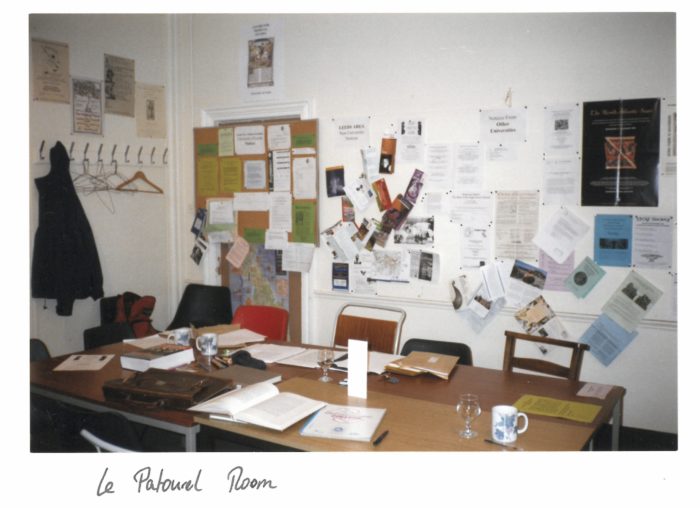
The original Le Patourel Room, in what is now the Workshop Theatre.
Establishing the Centre
By the early 1990s nearly 100 MA students had graduated from the CMS and it developed links with the Royal Armouries, the Henry Moore Institute, and Leeds Museums and Galleries.
In 1996, Mary Swan was appointed as the Director of Studies, the first person to be appointed directly to the CMS. A tenacious advocate for the Centre, Mary oversaw the introduction of the PhD programme in Medieval Studies in 1999 and undergraduate elective modules. She was also instrumental in arranging the move to the current premises on the top floor of the Parkinson Building.
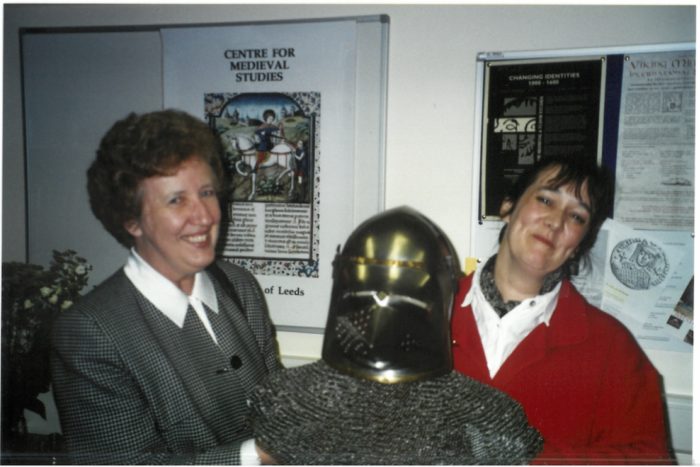
Joyce Hill, Emeritus Professor of Medieval Literature and Karen Watts, Curator Emeritus at the Royal Armouries.
Students, staff and activities: 2003-2011
The guiding principles of the IMS
In 2003, the CMS and IMI joined forces to form the Institute for Medieval Studies (IMS). This brought under one roof all activities associated with Medieval Studies at Leeds and enabled greater cohesion as we became one body.
The value of the whole thing lies as much in bringing together the teachers who are medievalists as in anything we may do for our students.
John Le Patourel
Emeritus Professor of Medieval History
Interdisciplinarity
One of the founding principles of the IMS was interdisciplinarity. The members of the Institute have been drawn from different departments, including Arabic and Islamic Studies, Archaeology, Continuing Education, East Asian Studies, English, Fine Art, French, Geography, German, History, Italian, Music, Philosophy, Theology and Religious Studies, brought together by an intellectual curiosity for the Middle Ages.
Studying the Middle Ages benefits from a broad range of skills. The staff and students of the IMS have always benefited from its rich pool of knowledge and expertise.
Community
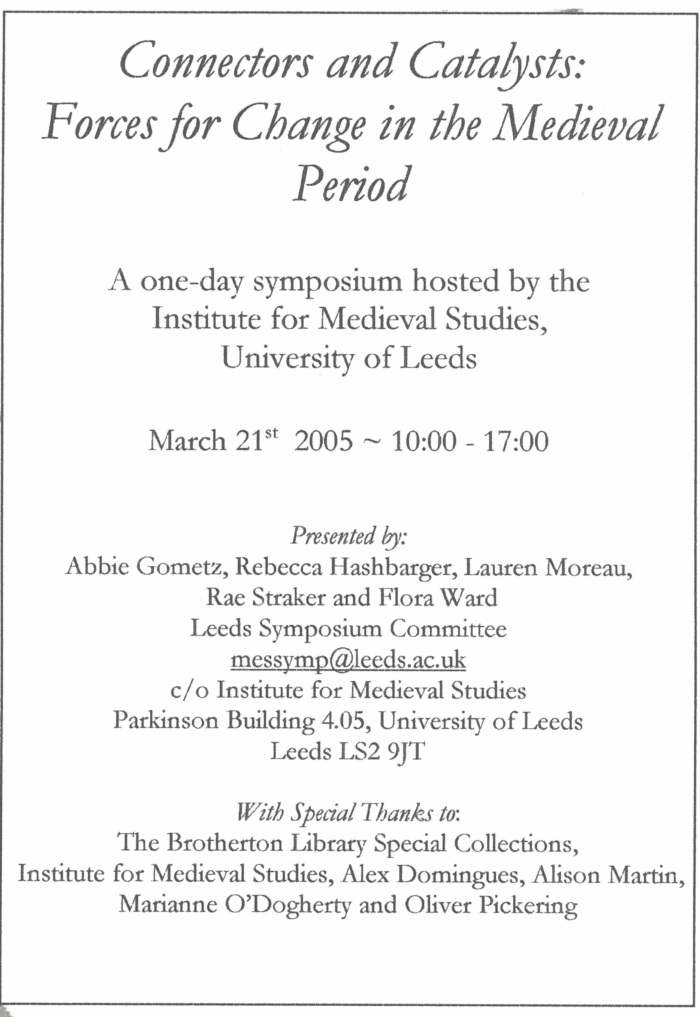
A flyer for the IMS Postgraduate Symposium, March 2005.
Students have always been at the heart of the IMS. From its foundation the Institute was intended to provide rigorous, skills-based training to prepare students for research.
The acquisition of larger, centrally located premises gave the Institute a home, a sense of place, and a locus for staff and students to meet.
Over the years, the Le Patourel Room became a hub of collegial activities among MA and PhD students and a welcoming venue for a wide range of research activities and public events.
Postgraduates at Leeds have often been at the forefront of innovative research activities such as the Mystery Cycles, and the long-running tradition of successful postgraduate conferences, and a particularly large number of student-led reading groups including Arabic, Byzantine Greek, French, German, Italian, Old English, and Old Norse.
Internationality
From the beginning, the Institute brought together scholars whose work focused not just on Britain, but the wider medieval world. We have always sought to develop an international presence by recruiting students from around the world and by maintaining close ties with other international institutions.
We should never downplay, whatever the formal structures are, the value of crossing boundaries and getting to know people.
Joyce Hill
Emeritus Professor of Medieval Literature
The first colloquium of the Société Internationale pour l’étude du Théâtre Médiéval (SITM) was held in Leeds in 1974, at the instigation of Lynn Muir. This ‘essential and revolutionary emphasis on the value of crossing national boundaries’ was at the centre of Lynn’s vision and remains at the heart of the IMS’s mission. The IMS remains committed to fostering international academic cooperation through colloquia and research projects. It frequently hosts visiting doctoral and postdoctoral researchers from outside the UK.
The International Medieval Bibliography (IMB) and International Medieval Congress (IMC) have always been principally international endeavours. One of the key aims of the IMB was to provide access to non-Anglophone scholarship. At the first IMC in 1994 about 1/3 of participants were from Europe and 1/3 international. During the planning of the first Congress it was thought particularly important to make links with academics from Eastern European countries and ensure that they were supported in attending.
Moving forward: 2011 to now
In 2011, the Institute for Medieval Studies (IMS) was incorporated into the School of History, to ensure its organisational stability and growth. Since then the Institute has maintained large and successful cohorts of MA and PhD students. We have developed a range of attractive internships within the IMS to foster the transferable skills of our postgraduates.
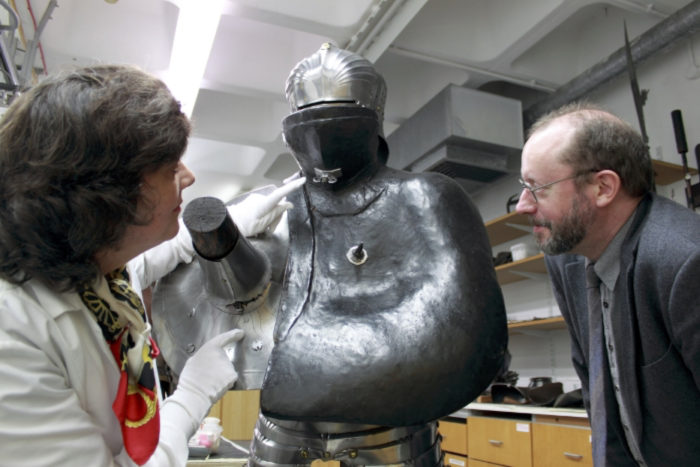
Karen Watts, Curator Emeritus at the Royal Armouries, and Alan Murray, Senior Lecturer in Medieval Studies and Editorial Director of the International Medieval Bibliography.
We have utilised the holdings of heritage organisations around Leeds for collaborative projects.
We have built on our links with the Royal Armouries, becoming a key centre for the study of the material culture of arms and armour. We have also worked collaboratively with Leeds Museums and Galleries to further understanding of the archaeological remains of medieval monasticism.
We have also capitalised on the extensive holdings of the Brotherton Library, including the Ripon Cathedral Archives, the early book collection, and the archives of the Yorkshire Archaeological and Historical Society.
Where next?
Increasingly, our focus is on student-led and student-focused projects. We have had great success communicating our cutting-edge research to the public at the Wellcome Trust-funded ‘You Are What You Ate’ events, Light Night, and the ‘Bodies Ignored/Bodies Obsessed’ events.
We continue our long tradition of successful postgraduate conferences, attracting scholars from around the world on topics including monasticism, the culture of war, the medieval Mediterranean, gender, body, and animal studies.
The Leeds University Union Medieval Society was created in 2013 by Rose Sawyer, a PhD student in Medieval Studies, and has organised varied programmes of events, excursions, workshops, and film screenings often in collaboration with Medieval Group and the International Medieval Congress (IMC).
The IMB has linked up with the Bibliographie de civilisation médiévale (University of Poitiers) and the International Bibliography of Humanism and the Renaissance (Thessaloniki).
In 2017, the IMS formalised links with the Centre d’études supérieures de civilisation médiévale at the University of Poitiers, signing an Erasmus+ treaty to promote staff and student exchanges between both institutions.
Looking towards the future, we will develop new international relationships, build on existing White Rose collaborations, and engage further with the wider community. The supportive nature of our postgraduate community will remain central to our approach to teaching and research training in Medieval Studies.
Mystery Plays at Leeds
In 1974, a group of medieval drama enthusiasts from the GCMS, headed by Lynn Muir and Jane Oakshott, proposed to stage a set of medieval mystery plays. These are late medieval biblical dramas collected together into ‘cycles’ performed on stages built on top of wagons, which moved between performances as a procession.
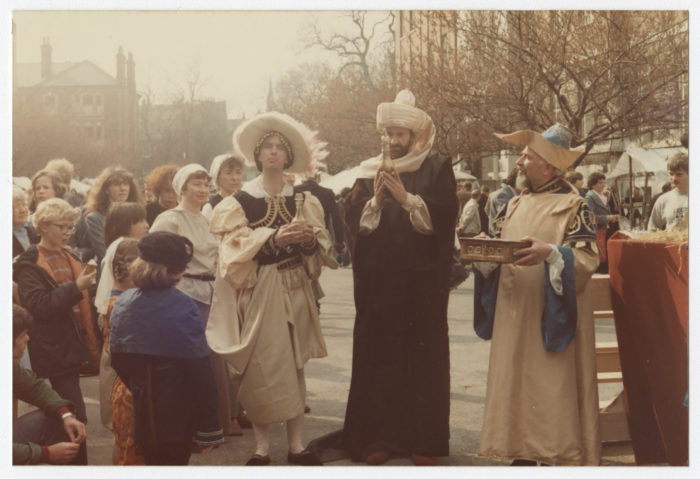
Daphne Franks, Doreen Jobbins, Stephen Franks, Charles Oldroyd, and Ron Blass of the Swarthmore Centre performing The Three Kings, 1983.
As it would have been in medieval times, the York Cycle was staged by 42 companies from many backgrounds, including drama groups, Yorkshire colleges, and dozens of University of Leeds departments.
I can remember Jane Oakshott standing over by the window saying, 'Why don't we do it? Why don't we put it on? Let's do it!' and she became very excited, and we thought, 'I don't know? Can we cope?'
Peter Meredith
Emeritus Professor of Medieval Drama
The production involved wagons borrowed from a local farm with different superstructures for each play.
To enhance the feeling of a real medieval mystery cycle, a market was organised around the University campus.
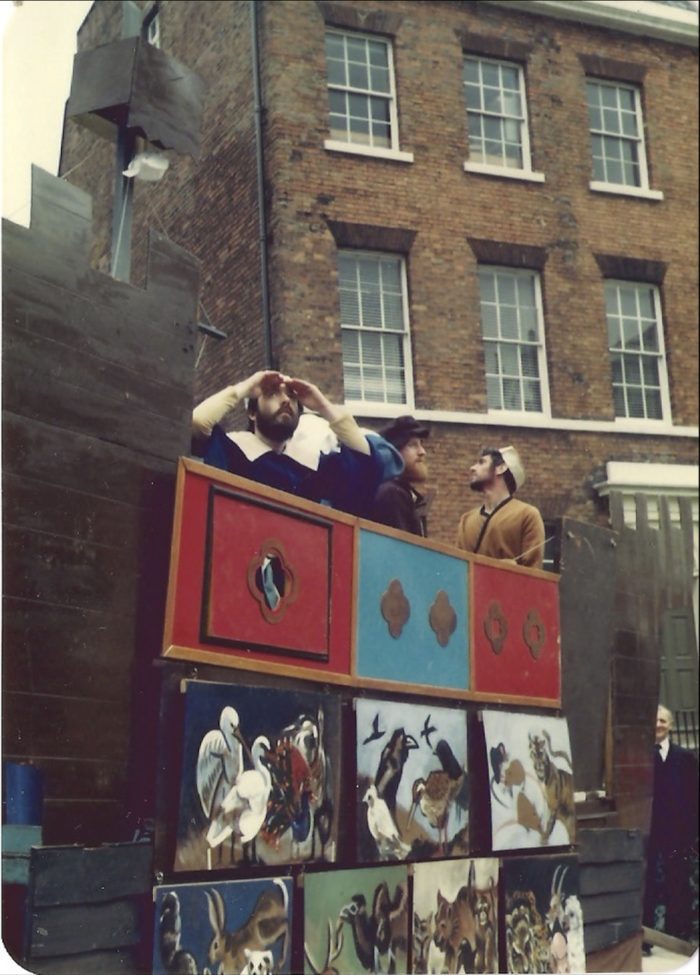
Paul Valois, Colin Lunt, and Adrian Smith of the Brotherton Players, performing Noah and the Flood, 1983.
The York Cycle was a great success and inspired many other productions. These include a staging of the Wakefield Cycle in Wakefield town centre in 1980 and the Chester Cycle at the University of Leeds in 1983.
In 1994, the York Cycle was performed from wagons in York city centre for the first time since the sixteenth century.
Hilda Purvis was the literary executor of her brother Canon John Stanley Purvis (d. 1968) who edited and translated the York Mystery Cycle. The royalties for this edition continue to contribute to School of English postgraduate funding.
Community
The Medieval Group and the early academics of the GCMS included enthusiasts for medieval drama from many different disciplines including English, History, Music, French, and Italian. This group met habitually for lunch and conversation on Wednesdays in Lynn Muir’s office. This ‘Wednesday Lunchtime Group’ provided the venue for the genesis of the 1975 Mystery Cycle.
I was conscious of a sense of the medieval mind in the acting and this was enhanced by the feeling that one was really back in the centuries that went before this reconstruction.
Hilda Purvis
May 1975
Le Patourel
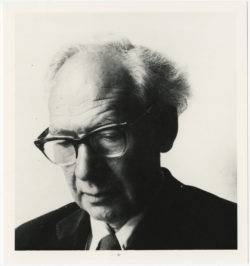
John Le Patourel was born in 1909 in Guernsey. Educated at Elizabeth College, Guernsey, and Jesus College, Oxford; Le Patourel was a prominent historian of the High Middle Ages, specialising in England and France. His most influential book, The Norman Empire (1976), reflected his heritage as a Channel Islander. In the Second World War he was a founder member of the Guernsey Society, which was established to represent the interests of Nazi-occupied Guernsey to the British government.
Le Patourel was appointed Professor of Medieval History at Leeds in 1945. He was a leading member of the Medieval Group, members of which would form the nucleus of the GCMS. He is remembered fondly as a kind and intelligent man, who was well-respected and well-liked. Upon his retirement he was presented with two festschriften, one from Northern History and the other contributed by the Staff Medieval Group. John Le Patourel died in 1981.
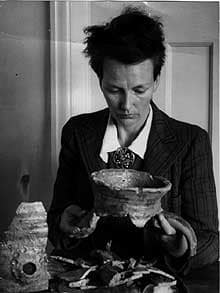
Jean Le Patourel
In 1939 John married (Hilda Elizabeth) Jean Bird, an expert in medieval ceramics. Jean Le Patourel was involved in the excavation of many medieval sites around Yorkshire, including Kirkstall Abbey and Wharram Percy. She was a lecturer in the Department of Adult Education and Extra-Mural Studies at Leeds and an ardent supporter of the Yorkshire Archaeological Society and the Thoresby Society. Jean remained a keen supporter of Medieval Studies at Leeds until her death in 2011. A great lover of dogs, Jean became the foremost expert on the archaeology of pre-modern dog-collars.

